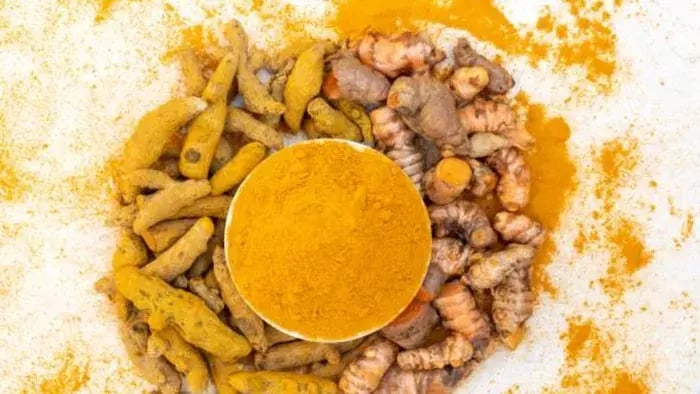- Haldi (Turmeric): The Golden Healer
- Tulsi (Holy Basil): Nature’s Respiratory Guard
- Ginger (Adrak): The Everyday Warrior
- Garlic (Lahsun): Your Natural Antibiotic
- Black Pepper (Kali Mirch): The Absorption Booster
- Cinnamon (Dalchini): Sweet and Strong
- Cumin (Jeera): Gentle but Powerful
- Honey (Shahad): The Natural Soother
- Amla (Indian Gooseberry): Vitamin C Powerhouse
Introduction

Your kitchen is the first line of defense against everyday illness. Before fancy supplements and packaged health drinks arrived, Indian households have been using their spice boxes, jars of seeds and fresh herbs to stay strong through the changing seasons. And with good reason, many of these ingredients work in the background to help your body fight infections, reduce inflammation and stay energized.
Even if it is a pinch of haldi (turmeric) in your dal, a spoonful of raw honey in warm water or fresh tulsi leaves chewed in the morning, these habits aren’t old-fashioned, they’re timeless. They’ve stood the test of generations not just because they’re easily available but because they work in harmony with our food, climate and daily routines.
Here are nine everyday ingredients from your Indian kitchen that can add flavor to your food, and they support your immune system in simple ways.
Top 9 Immune Boosters Found in Your Indian Kitchen
When you think of immunity, you might picture supplements and syrups. But often, your body’s best defense lies right where you least expect it, your spice box and pantry. Indian kitchens have long held a treasure trove of natural ingredients that quietly support good health. From age-old home remedies to daily cooking staples, these everyday items can strengthen your body’s ability to fight illness.
Haldi (Turmeric): The Golden Healer

According to a study published in Front Pharmacol. 2020, curcumin, the main compound in haldi, is known for its anti-inflammatory and antioxidant properties. A pinch of warm milk or dal can support your immune system and help manage minor infections. If your child has a cough or is feeling low, haldi doodh before bed can work wonders.
Tulsi (Holy Basil): Nature’s Respiratory Guard
As per a study published in J Ayurveda Integr Med. 2014, tulsi is often found in home gardens for a reason. It helps with respiratory wellness, especially during seasonal changes. Add a few leaves to your morning chai or make tulsi water to sip through the day. It's known to ease congestion, reduce stress, and build resistance against infections.
Ginger (Adrak): The Everyday Warrior
Research conducted by Boca Raton 2011, fresh ginger aids digestion and fights inflammation. Its warming quality helps during colds or sore throats. A bit of grated ginger in your chai, soups, or khichdi supports gut health, which is directly linked to your immune system’s strength.
Garlic (Lahsun): Your Natural Antibiotic
As per research done by Front Microbiol. 2021, lahsun is rich in allicin, which supports immune responses and fights microbes. Use it generously in tadkas, chutneys, or roti stuffing. Its strong smell fades with cooking, but its protective benefits remain.
Black Pepper (Kali Mirch): The Absorption Booster
Study conducted by, Front Nutr. 2023, shows piperine in black pepper increases the absorption of other immunity-friendly compounds, especially curcumin from turmeric. Add freshly crushed pepper over soups, sabzis, or even salads to boost overall health.
Cinnamon (Dalchini): Sweet and Strong
Research published in J Diabetes Sci Technol. 2010, shows that dalchini has antiviral and antifungal properties. It can help regulate blood sugar and support immune health, especially in winter months. Sprinkle it into warm milk, add to porridge, or use in baking as a healthier flavour twist.
Cumin (Jeera): Gentle but Powerful
According to a study published in Gut Microbes. 2024, digestion and immunity go hand in hand. Jeera supports gut balance and helps in nutrient absorption. Jeera water in the morning or roasted jeera in your raita can help children maintain healthy digestion through changing seasons.
Honey (Shahad): The Natural Soother
A study published in Asian Pac J Trop Biomed. 2011, suggests that Pure honey can help relieve throat irritation, suppress coughs, and act as an antibacterial agent. You can mix it with warm water, lemon juice, or tulsi tea. (Avoid for kids under 1 year.) It’s a great alternative to sugary syrups and a natural way to build resilience.
Amla (Indian Gooseberry): Vitamin C Powerhouse
According to a study published in Antioxidants (Basel). 2022, rich in vitamin C, amla helps the body build white blood cells and fight off infections. Whether in the form of murabba, juice, or raw slices with a pinch of salt, it adds tangy strength to your child’s diet.
Conclusion

You don’t always need to reach for a medicine cabinet when the first sneeze or cough appears. Sometimes, the best support comes from your daily meals, made with love and ingredients that have stood the test of time. These nine immunity boosters are not exotic or hard to find; they’re already part of your home. All they need is your intention. By weaving these into your family’s everyday food, you’re nurturing not just bodies but long-lasting wellness habits.
Her love for storytelling began with reading her grandfather’s speeches, where Tarishi saw the power of words in creating lasting memories. Combining her passions for food and writing, she has turned her life into a fulfilling path of sharing stories that celebrate flavours and how food brings communities together.
The views expressed are that of the expert alone.
The information provided in this content is for informational purposes only and should not be considered a substitute for professional medical advice, diagnosis, or treatment. Always seek the advice of your physician or another qualified healthcare provider before making any significant changes to your diet, exercise, or medication routines.
References
https://pmc.ncbi.nlm.nih.gov/articles/PMC9137578/
https://pmc.ncbi.nlm.nih.gov/articles/PMC3609166/
https://pmc.ncbi.nlm.nih.gov/articles/PMC10773664/
https://pmc.ncbi.nlm.nih.gov/articles/PMC2901047/
https://pmc.ncbi.nlm.nih.gov/articles/PMC8362743/
https://www.ncbi.nlm.nih.gov/books/NBK92775/
















